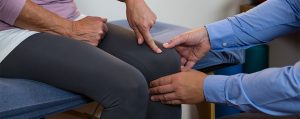More Than Kegels: 4 Things You Didn’t Know About Pelvic Health Physical Therapy
Everyone has pelvic floor muscles that support their pelvic organs, help you control bowel and bladder functions, and aid in sexual functions. These muscles can be exercised like any other muscle in your body. When you think about pelvic floor exercises, most people think of Kegels, but you might be surprised to learn that not everyone should do them. There are many causes of pelvic floor dysfunction, thus, many reasons why one might seek pelvic health physical therapy. Some common conditions that can be treated with the help of a pelvic health physical therapist include urinary or fecal incontinence, constipation, frequent urination, pelvic organ prolapse, pelvic pain, sexual dysfunction, pain with intercourse, and issues experienced both pre- and postpartum.
Can Physical Therapy Help My Menopause?
You probably know about “typical” menopause symptoms – trouble sleeping, mood swings, and hot flashes are a few that come to mind right away. Did you know that your pelvic floor undergoes changes as well? Read on to learn how pelvic health physical therapy (PT) can help with these changes!
Bleeding Disorders: How Can They Impact My Pregnancy, And How Can PT Help?
Bleeding and clotting disorders affect many people in the United States and throughout the world. When someone has a bleeding disorder, their blood often clots too slowly, which can lead to complications throughout the body.
Pregnancy adds new considerations if you have already been diagnosed with a bleeding disorder. Staying in close contact with a physical therapist can help keep you safe and healthy during your pregnancy.
Getting To Know Your Pelvic Floor: Why Pelvic Health Therapy May Just Be For You
Everyone has a pelvic floor, including you. So, let’s get to know it!
Your pelvic floor is made up of three layers of muscles and is supported by several ligaments, fascia, and bones. The pelvic region helps your body perform several daily tasks:
New Moms & Birth Parents: Here’s What You Need To Know About Diastasis Recti
Becoming a new mom or birth parent is a joyous yet challenging occasion. One challenge that many face during pregnancy and after giving birth is diastasis recti. It is a common condition that occurs when the two sides of the rectus abdominis muscle (the six-pack muscle) separate during pregnancy. This separation can cause a bulge in the abdomen or other symptoms like low back pain, making it difficult to exercise or return to your pre-pregnancy function. Luckily, this condition can be treated successfully with physical therapy.
How Exercise Can Boost Mental Health During Postpartum Depression
Exercise is known to have many physical benefits, including improved quality of life and reduced risk of chronic disease. As most individuals know, exercise helps improve physical health and has mental health benefits. Exercise can help by improving self-esteem and cognitive function, as well as reducing mental health concerns, including anxiety, depression, and negative mood. Exercise plays a role in mental health care by increasing blood circulation to the brain leading to a reduced reactive response to stressors. Despite the most recent research, exercise is often underutilized as an intervention regarding mental health, specifically in the postpartum population.
Struggling With Incontinence? Here Are 3 Exercises You Should Try, According To A Pelvic Health PT
Incontinence, or the lack of voluntary control over urination and defecation, can be life-altering. It can come in six types: insensible, stress, urgency, mixed, nocturnal enuresis, and overflow. Depending on the type of incontinence, your therapy will be specific to you. However, below, you will find the most common pelvic floor retraining exercises to help get you started. For more personalized care, please reach out to a physical therapist (PT) near you.
3 Reasons to Try Pelvic Health Physical Therapy
Pelvic health physical therapy evaluates and treats health issues ranging from incontinence, pelvic and vaginal pain, prenatal and postpartum musculoskeletal pain, osteoporosis, lymphedema, to rehabilitation following breast, genital, and gender affirmation surgery. It involves the treatment of disease, injury, or dysfunction by physical methods such as stretching, strengthening, muscle re-training, manual therapy, the use of modalities and pain science for pain management, and behavioral modifications rather than by drugs or surgery. This style of conservative care can help improve the quality of life for you and the ones around you. Below you will find three reasons to seek pelvic health therapy and get the care you need.
